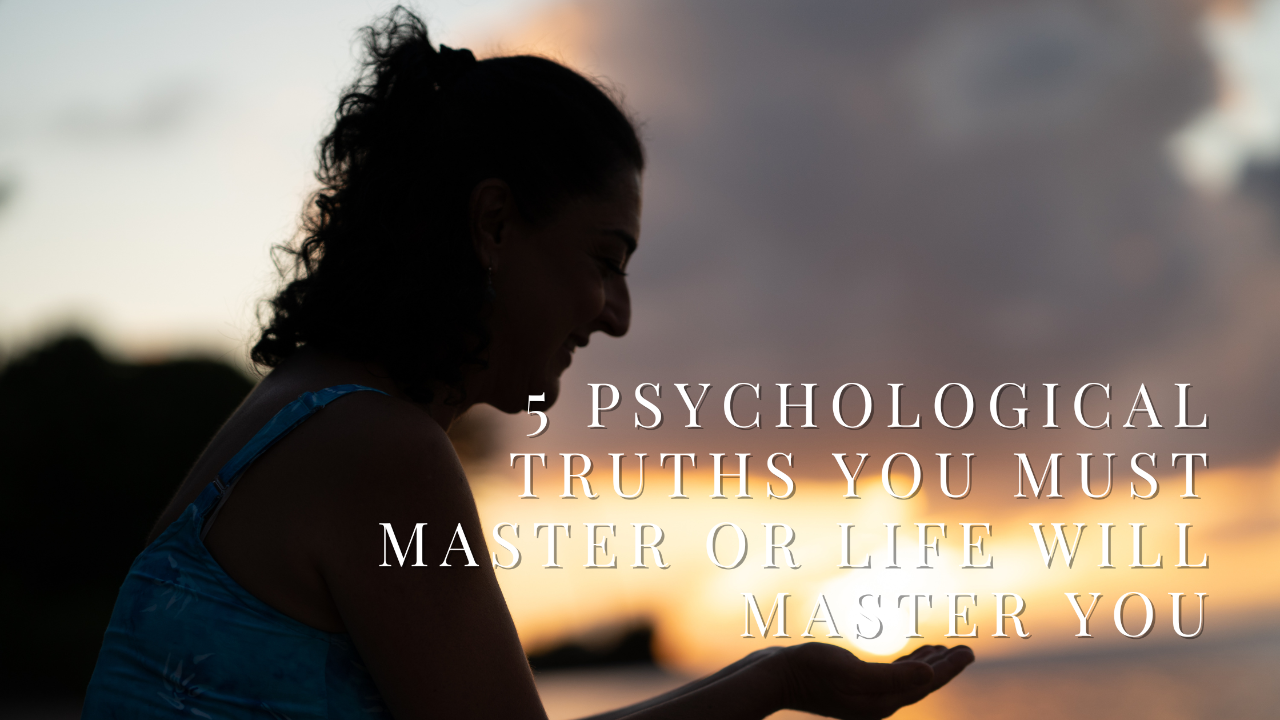5 Psychological Truths You Must Master or Life Will Master You

Most people think they’re in control of their lives. They set goals, make plans, and chase success, yet somehow, life still feels like it’s steering the wheel.
The truth is, unless you understand your own psychology, you’re not the one driving; your unconscious mind is.
Understanding how your mind truly works is the difference between reacting to life and consciously creating it. These five psychological truths reveal how your inner world shapes everything: your choices, your relationships, and your sense of peace. Master them, and you master yourself.
1. You Don’t See Reality, You See Your Interpretation of It
Your mind doesn’t record reality like a camera; it constructs it. Every moment you experience is filtered through your beliefs, emotions, and memories. This means you’re not responding to what’s happening; you’re responding to what your mind thinks is happening.
Two people can live through the same event and walk away with completely different stories. That’s because perception isn’t truth; it’s projection. When you mistake your interpretation for reality, you become trapped in your biases and judgments. But when you pause and ask, “What else could this mean?” you open space for clarity, empathy, and growth.
“We don’t see things as they are; we see them as we are.” - Anaïs Nin
Mastery tip: Before reacting to someone or something, assume your perception is only one version of the truth. Curiosity dissolves conflict faster than judgment ever could.
2. Your Unconscious Mind Runs the Show
Freud called it the “unconscious.” Jung called it the “shadow.” Modern neuroscience calls it “automatic processing.” Whatever name you give it, this truth remains: most of what drives you is hidden from you.
Your fears, patterns, and habits are often echoes of the past, childhood beliefs, and emotional imprints replaying through adult decisions. You think you’re choosing freely, but in reality, your subconscious is repeating what’s familiar, not what’s best.
“Until you make the unconscious conscious, it will direct your life and you will call it fate.” - Carl Jung
Mastery tip: Track your emotional patterns. What situations trigger you the most? What themes keep repeating in your relationships or career?
Your patterns are not punishment, they’re messages from your unconscious, asking to be seen.
3. You Are Not Your Thoughts or Emotions
You are not your anxiety. You are not your anger, your doubts, or your sadness.
You are the awareness noticing them. Most people live fused with their inner chatter: “I am anxious,” “I am not enough,” “I am failing.”
But these are thoughts, not identity. Once you realize this, your suffering loses its grip. Between stimulus and response lies a sacred space, the space where freedom lives. In that space, you can choose how to respond instead of reacting on autopilot.
“Between stimulus and response, there is a space. In that space is our power to choose our response.” - Viktor Frankl
Mastery tip: When a thought or emotion overwhelms you, say to yourself, “I’m noticing the thought that…” or “I’m feeling the emotion of…” This small shift turns identification into observation, and observation is power.
4. Avoidance Creates More Pain Than What You’re Avoiding
The greatest source of psychological suffering isn’t pain itself, it’s the avoidance of pain. We suppress emotions, distract ourselves, and run from discomfort, thinking it’ll protect us. But what we resist only grows stronger.
Avoidance builds anxiety, resentment, and disconnection. Facing your fears even gently dissolves their control over you.
“The cave you fear to enter holds the treasure you seek.” - Joseph Campbell
Mastery tip: Next time something triggers you, instead of shutting down or escaping, pause and ask: “What emotion or truth am I avoiding right now?”
Courage isn’t the absence of fear; it’s the willingness to walk through it.
5. Meaning and Connection Are Psychological Oxygen
You can achieve everything you’ve ever wanted and still feel empty if your life lacks meaning. Humans are not wired for endless comfort; we’re wired for purpose. Viktor Frankl, a Holocaust survivor and psychiatrist, discovered that people can endure almost anything, as long as their suffering has meaning.
Without meaning, even pleasure feels hollow. With it, even struggle feels sacred.
“He who has a why to live can bear almost any how.” - Nietzsche
Mastery tip: Anchor your days in something larger than yourself, love, creativity, contribution, or service. Meaning doesn’t have to be grand; it just has to be true.
Conclusion: The Art of Mastery
Mastering your psychology doesn’t mean “fixing” yourself; it means understanding yourself deeply enough to live consciously. When you start seeing through your filters, integrating your shadows, and choosing awareness over reaction, life stops feeling like a battle. It becomes a collaboration with something wiser within you. The world may remain unpredictable. But once you master your mind, life no longer masters you. YOU DO.
Stay connected with news and updates!
Join our mailing list to receive the latest news and updates from our team.
Don't worry, your information will not be shared.


